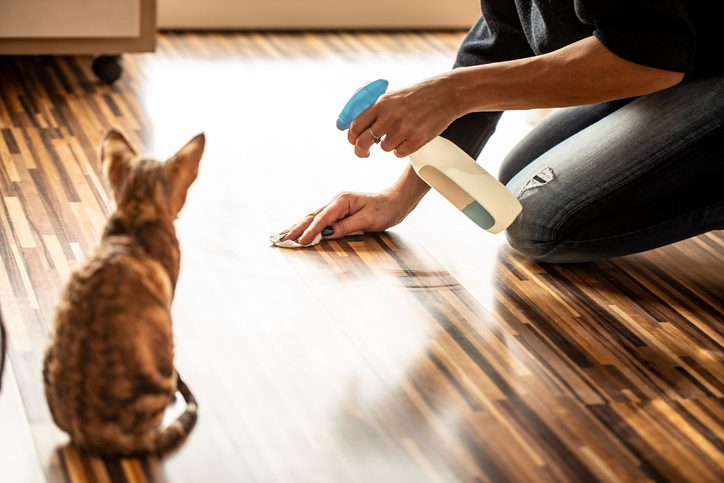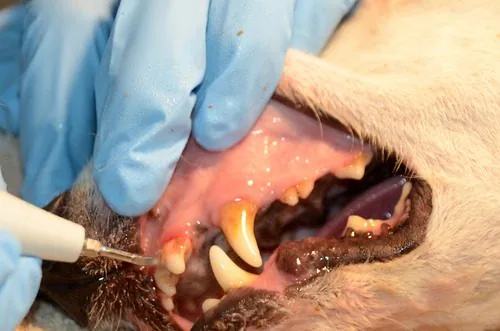Do Female Cats Spray in Bolingbrook, IL?
Many future cat owners will choose a female cat over a male, because male cats have a reputation for being nasty because of spraying urine. This age-old myth leads many male kittens to be abandoned and causes adult female cats to be surrendered by unhappy owners. Female cats do spray from time to time. Read our blog post as we dive more into this question and causes that may be leading to your female cat spraying.
What is Spraying?
Spraying is the distribution of concentrated urine on walls, furniture, and other areas. Spraying happens when the cat backs up to a surface and releases a spray of urine. Usually, this happens on a vertical surface, like a wall or the side of the couch or chair. Because this is a very small amount of concentrated urine, spray has a much stronger smell than feline urine.
Spraying is a specific behavior. This is not the same as peeing outside the litter box. When cats urinate outside the litter box, a puddle of urine will be on the floor. There may even be a bit of litter on top if the cat attempted to cover it. The reasons for peeing outside the litter box have more to do with cleanliness or illness, while spraying is caused more by territorial claims or stress.

Reasons for the Behavior
There can be many reasons cat’s spray. In the past, people thought it was a sexual behavior unique to male felines, but this is not the case.
Marking Territory
Male and female cats will spray to alert other cats to their presence. This is true of cats that live primarily in multiple cat households. Each animal wants to have his or her own personal space, and spraying is a way to mark that space.
Outdoor cats will spray around the perimeter of the house and yard to keep strays away. They may also spray on a favorite plant or tree to let other cats know not to use the bathroom there.
Indoor cats may spray on doors and windows if they see stray cats outside in the yard. Cats that live both indoors and outdoors will spray doorways and exterior walls and windows.
In multiple cat households, spraying is common when the cats feel overcrowded or anxious about not having their own safe space.
Stress
Like people, animals get upset and anxious in certain situations. This disruption of the normal routine causes nervousness. In cats, the response to this anxiety is spraying. Things that can cause anxiety in animals include introducing a new pet or family member, moving, having visitors or strangers in the house, or moving the food dish or litter box.
Cats are creatures of habit, probably more than any other animal. Even the slightest disruptions to their natural routine can cause reactions such as spraying.
If you know there is going to be a change coming up, prepare your pet ahead of time as much as possible. Introduce baby items and baby smells beforehand. If you are expecting visitors who will stay in a part of the house your cat frequents, close off that part of the house ahead of time and help your cat get used to feeding and using the litter box in another area. In multiple cat households, spraying can be a sign of fighting for equality. Make sure each cat has his or her own space, including feeding dishes, toys, and a secure hiding spot.
Sexual maturity
Another common cause of spraying in female cats, is the onset of sexual maturity. This usually happens around five or six months of age, and may also include loud crying, clawing on things, and aggressive behaviors. If you do no plan to have kittens, spaying a female cat can help with this sexual behavior.
Medical Problems
Female cats who spray frequently may be trying to alert you to a medical problem. Some common bladder ailments in cats include urinary tract infections, bladder issues, and kidney problems. The only way to detect these issues is through examination and blood work at your veterinarian’s office.

Ways to Lessen Spraying
If your cat sprays, there are a number of things you can try to help deter the behavior.
Spay or neuter your pet- In cats who are reaching the age of sexual maturity, the most common way to lessen spraying is through a simple procedure called spay or neuter. This minor surgery involves removing the reproductive organs.
Eliminate stress and disruptions- Try to avoid upsets to your cat’s routine. If you know there will be a stressor like home improvements, strangers visiting, or a new family member moving in, you need to help prepare your cat ahead of time. In an adult cat household, the addition of a new kitten can cause many negative behaviors. To minimize the anxiety caused by a new kitten, introduce them over several days, limiting exposure between the two. Also, make sure the new kitten has its own feed and water dish and litter box, away from the one the adult cat uses.
Give each cat a safe personal space- In multiple cat households, make room for each cat to have his own safe space. Provide multiple climbing toys, hiding beds, and feed dishes. Use multiple litter boxes. Give every cat plenty of lap time and play time.
Regular medical checkups-Take your cat to the vet at least once a year for a checkup. Make sure to keep vaccines up to date. If your cat is having any health problems, have the vet run the appropriate blood and urine tests to determine the cause and prescribe treatment.
Getting Rid of Spray Odors
Feline spray has a stronger and more offensive smell than regular cat urine. It is also harder to get rid of the smell because it often absorbs into walls or furniture. It is possible to remove most of the smell with enzyme-based cleaners. Do not use an ammonia based cleaner, as that will make the smell stronger and might cause additional spraying.
If you have any questions about your cat’s health, call us today at (630) 759-0093. Here at Boughton Square Animal Clinic, we are ready to help you and your pet with whatever you may need!
Recent Posts
Do Dogs Sweat?
Do Dogs Sweat? Many pet owners have pondered the age-old question: Do dogs sweat? Understanding how dogs…
Why Does My Dog Keep Panting?
Why Does My Dog Keep Panting? Dog panting is a common behavior that owners often overlook as…
Dog Heatstroke: Signs, Causes and Treatment Options
Dog Heatstroke: Signs, Causes and Treatment Options When the sun is shining bright and the temperatures soar,…
Why Regular Dog Teeth Cleaning is Important for Overall Health
Why Regular Dog Teeth Cleaning is Important for Overall Health Maintaining your dog’s oral health is crucial…
How Professional Dog Training Can Transform Your Canine Companion
How Professional Dog Training Can Transform Your Canine Companion Dog training is more than just teaching your…
About Boughton Square Animal Clinic
Since 1979, Boughton Square Animal Clinic has served Bolingbrook, IL and surrounding communities as both a veterinary care provider and a devoted partner in treating your animal family members for life.






